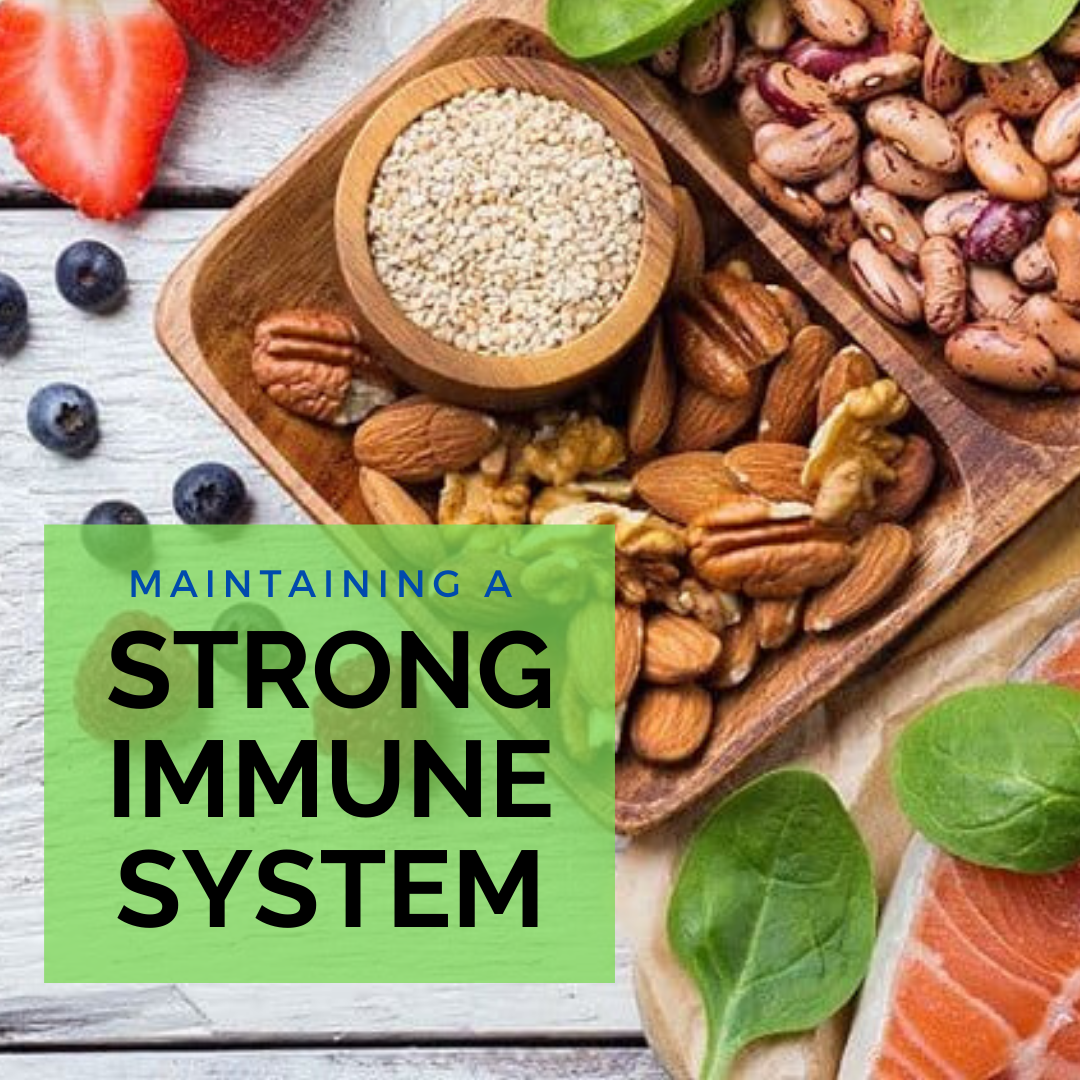

In this post, we discuss maintaining a strong immune system. Forget about promises of a “boosted” immune system. The word boost as it relates to improving immune system response is a misnomer. Our immune systems contain many, many different types of cells; scientifically we don’t fully understand the optimal quantity of immune cells we need, nor the optimal balance of immune cell types. A boost in immune cells in your body is not necessarily a good thing – ask someone with an auto-immune disease such as rheumatoid arthritis – their “boosted” immune system cells produce antibodies that attack their body’s own tissues, causing inflammation, swelling, pain, and sometimes permanent damage.
Healthy immune system function requires regular, diversified nourishment including certain essential vitamin and mineral micronutrients. Specifically – Vitamins A, C, D, E, B2, B6 and B12, folic acid, beta-carotene (precursor of Vitamin A), iron, selenium, and zinc. Ideally, get the recommended daily allowance (RDA) amounts of these vitamins through food. I’ve compiled a summary including foods having relatively high content of these micronutrients.

If you suspect your diet is not balanced nor diverse enough, or you are restricting energy intake, taking a daily multivitamin containing these micronutrients may be a good idea. Don’t fall into the fallacy trap that more is better; vitamin megadoses are unlikely to be beneficial, and possibly harmful in certain circumstances.
In addition to ensuring you get these micronutrients, you can support your immune system function by reducing chronic stress through good sleep, additional relaxation time, and exercise.
Acute physical stress from exercise can help support the immune system by mobilizing antibodies and white blood cells. However, during periods of increased risk of infection, it’s best not to over-train which may cause an undue pro-inflammatory response and suppress the immune system. Keep up your training regime and listen to your body/take rest if you have been pushing too hard.
Acute stress generates a short-term increase in the hormone cortisol – this short-term increase is beneficial for the actions of our immune system. However, when stress is chronic, we have consistently elevated of cortisol and our immune systems become impaired. Daily mediation, yoga or simply turning your mind toward positive thoughts and gratitude can reduce chronic stress levels.
In summary, the best way to support your immune system is to eat a diversity of foods containing key micronutrients, exercise, get enough sleep, and relax!
Reach out to me if you are looking for customized nutrition support for you health and goals.
Further Reading
Maggini, S.; Pierre, A.; Calder, C., Immune Function and Micronutrient Requirements Change over the Life Course, Nutrients, 10, 1531 (2018).
Huang, Z., Liu, Y., et al, Role of Vitamin A in the Immune System, J. Clin. Med. 7, 258 (2018).
Moriguchi, S., Muraga M., Vitamin E and Immunity, Vitam Horm, 59, 305 (2000).
Rail, L.C.,Meydani, S.N., Vitamin B6 and Immune Competence, Nutrition Reviews, 51, 217 (1993).
Carr, A.C., Maggini, S., Vitamin C and Immune Function, Nutrients, 9, 1211 (2017).
Chriumbolo, S., Bjorklund, G., et al, The Role of Vitamin D in the Immune System as a Pro-survival Molecule, Clinical Therapeutics, 39, 894 (2017).
Mikkelsen, K., Apostolopoulos, V., Vitamin B12, Folic Acid, and the Immune System, Nutrition and Immunity pp 103-114.
Segerstrom, C., Psychological Stress and the Human Immune System: A Metanalytic Study of 30 Years of Inquiry, Psychol Bull. 130, 601 (2004).
Hackney, A.C., The Immune System and Overtraining in Athletes: Clinical Implications, Acta Clin Croat, 51, 633 (2012)
Shankar, A.H.; Prasad, A.H., Zinc and Immune function: The Biological Basis of Altered Resistance to Infection, Am J Clin Nutr, 68, 447S (1998).
Gill, H.; Walker, G., Selenium, immune function and resistance to viral infections, Nutrition & Dietetics, 65, S41 (2008).
Hughes, D.A., Effects of Carotenoids on Immune Function, Proc Nutr Soc, 58, 713 (1999).